Plextor M3 Pro (256GB) Review
by Kristian Vättö on July 1, 2012 1:45 PM ESTRandom Read/Write Speed
The four corners of SSD performance are as follows: random read, random write, sequential read and sequential write speed. Random accesses are generally small in size, while sequential accesses tend to be larger and thus we have the four Iometer tests we use in all of our reviews. Our first test writes 4KB in a completely random pattern over an 8GB space of the drive to simulate the sort of random access that you'd see on an OS drive (even this is more stressful than a normal desktop user would see).
We perform three concurrent IOs and run the test for 3 minutes. The results reported are in average MB/s over the entire time. We use both standard pseudo randomly generated data for each write as well as fully random data to show you both the maximum and minimum performance offered by SandForce based drives in these tests. The average performance of SF drives will likely be somewhere in between the two values for each drive you see in the graphs. For an understanding of why this matters, read our original SandForce article.
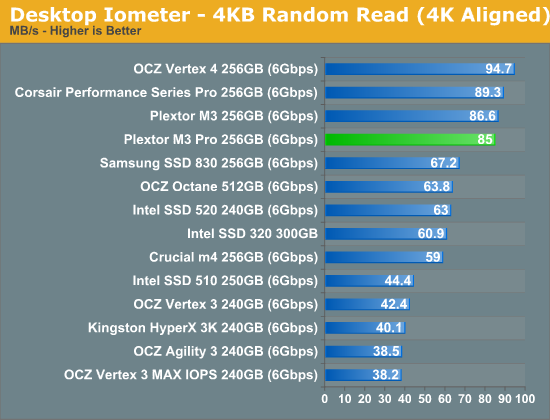
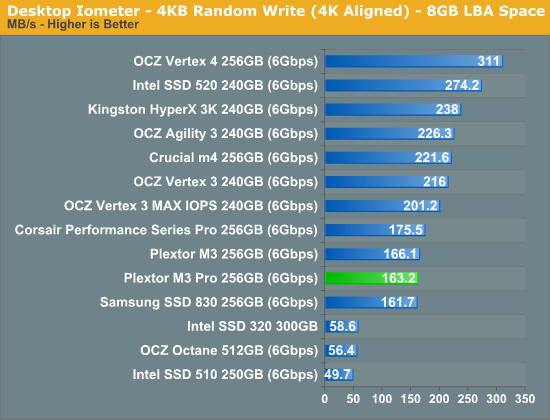
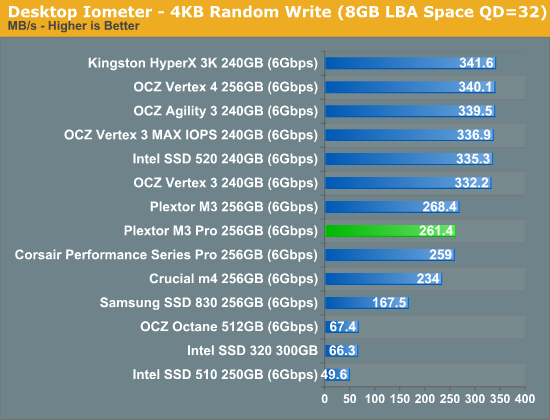
Random performance has not changed and the M3 Pro performs equally with the M3. The M3 Pro is actually slightly slower but the difference is only 1-3%, which is so small that it's within the margin of error.
Sequential Read/Write Speed
To measure sequential performance we ran a one minute long 128KB sequential test over the entire span of the drive at a queue depth of 1. The results reported are in average MB/s over the entire test length.
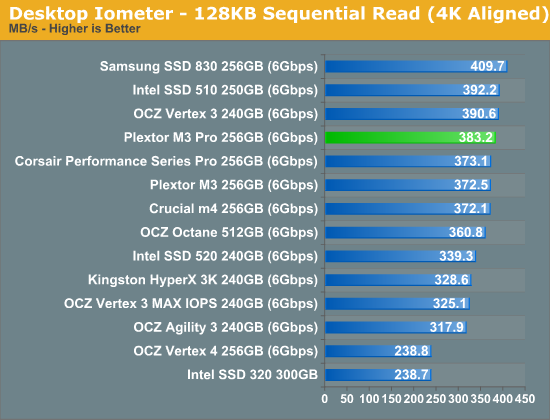
When moving to sequential read, the M3 Pro comes out as a faster drive compared to the M3. The difference is a mere 10.7MB/s, which translates to ~3%, so we aren't looking at a massive improvement here.
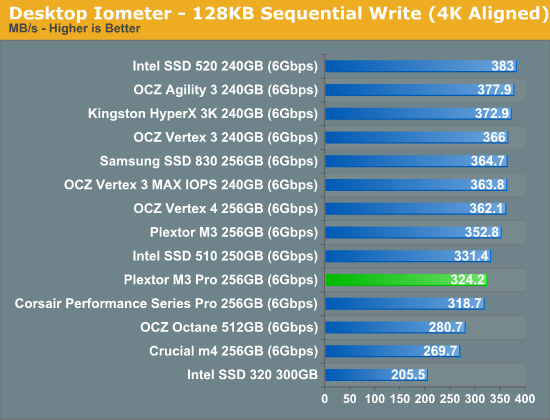
Sequential write speed turns out to be a surprise: the M3 is nearly 30MB/s (~9%) faster here. I even ran the sequential write test on the M3 Pro several times to make sure this is not an error on our end. However, it should be kept in mind that sequential write is just one aspect of performance—this doesn't mean that the M3 Pro is worse than the M3.










55 Comments
View All Comments
Chaitanya - Sunday, July 1, 2012 - link
I associate names like plextor and lite-on with optical discs. now they are into solid state media as well. wondering whats next.DaFox - Sunday, July 1, 2012 - link
Plextor was amazing back when optical drives were relevant.iamkyle - Sunday, July 1, 2012 - link
You mean, before they stopped manufacturing their own driveslexluthermiester - Sunday, July 1, 2012 - link
Quote; "back when optical drives were relevant."Last time I checked, optical drives are still in very common use for a wide variety of purposes. How are they not still relevant?
HisDivineOrder - Sunday, July 1, 2012 - link
There was a time when a new CD-ROM or DVD-ROM would have people scouring the web for reviews because the new drive would offer greater and greater speeds.Nowadays, people just buy whatever's cheapest or goes good with their case. They MAY look at compatibility with discs beforehand, but often don't if they're looking at a $20 DVD-/+RW. If they do, that's a few user reviews and then bam, bought. If it's crap, they throw it away and buy another.
This is far from the ancient times when a CD-ROM or DVD-ROM would warrant a full-on review with technical read-outs, minor speed differences against other models, etc. There's no point now because they're so cheap and there are no new advances being done in the field because USB storage (flash and hard drives) became so damn cheap along with the proliferation of online with digital storage.
There's a new hotness in town and we should all queue up the Toy Story sad music for ODD's. I imagine all my ODD's talking in the dusty, plastic bin of forgotten tech. They scramble out and reminisce about the times I used to have with them. The old Lite-On DVD-RW chatting with a Plextor CD-RW. A 2x DVD-ROM by Creative talking to a Pioneer DVD-slot. Every now and then, a Zip drive crying, "Hai guyz! Im hear two!"
And them all looking at him, patting him on the head, and saying, "Adults are speaking." Then lil' Zip drive'll look down and mumble something about how he used to be awesome. Meanwhile, my Sound Blaster, Sound Blaster 16, Sound Blaster AWE, Audigy, Audigy 2ZS, Aureal, Diamond 3dFX Voodoo, Voodoo 2 SLI, Matrox G200, they all chat amongst themselves about the days back when PC's were actually hard to build, compatibility was a shot in the dark and a prayer bound by McGuyver's chewing gum, and when installing Windows involved starting it and wandering away for 10 minutes (or less).
The best days are behind us, I think. Strange how the easier things get, the less awesome they feel.
erple2 - Monday, July 2, 2012 - link
If these posts were rated, you sir, would receive a +1 from me. Trips down memory lane are always fun to do now and again. I remember amber buying my first Texel drive in the very early 90s because they were so Mich more reliable, and faster.Those were truly the halcyon days...
speculatrix - Monday, July 2, 2012 - link
+1So much of what used to be hard is now trivial, and the young generation really don't need to understand how computers work. Sure that's no bad thing for productivity, but means we're raising new generations who are unable to design the next generation of hardware.
Here is Cambridge England I see the average age of engineers rising all the time. Companies struggle to find truly gifted embedded skills.
StevoLincolnite - Monday, July 2, 2012 - link
Ah, the good old days of setting individual jumpers for a CPU's FSB, multiplier and voltage... Needing a dedicated cable that goes from your optical disk drive to your sound card JUST so you can play Audio...Setting IRQ's in the bios/windows... Fun days for the tinkerer.
Now everything is just plug and play pretty much.
versesuvius - Monday, July 2, 2012 - link
Let's see an Apple (McIntosh) user go down the memory lane. I suppose theirs turns out to be 1 centimeter in length. Something like:"It was always like this. We paid triple the amount a Windows user did. Then again we were always better than them. Steve Jobs may be gone, but we are still better than them. We are just better. Long live Steve."
Just joking, of course.
tjoynt - Monday, July 2, 2012 - link
+1 Internets to you Sir or Mam! Thank you for bringing me down memory lane and reminding me how difficult and exciting it used to be. :) Now that everything pretty much Just Works, much of the fun and mystery is gone.Sure I follow the next hotness too, but building a computer today is like building with legos: just follow the pictures and snap it together. No more IRQ conflicts or DMA errors. RAM incompatibility is still a source of "fun" but that has always been annoying rather than interesting.
Sure, we can focus on actually Getting Things Done now, but so can everyone else. Being a hardware geek is not as special anymore. Of course the complexity and flakiness of software will keep us well-rounded geeks well entertained (and employed) for quite a while to come. :)